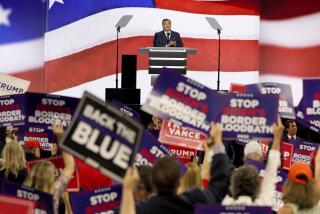Social Change Cheaper Than $30-Billion Crime Bill
- Share via
How much safety will a $30-billion anti-crime bill buy Americans?
It will buy some reduction in crime and give a boost to a growing crime prevention and control industry. But to bring about the law-abiding society that Americans long for these days will take social changes we may be unwilling--or unable--to make. There are contradictions in crime and challenging questions for American society.
First, and surprisingly, we should be aware that crime statistics issued by the Federal Bureau of Investigation show burglaries and other crimes against property declining. Homicides, rapes and robberies against adults are also down.
However, juvenile crime is up--the gang violence and drive-by shootings that punctuate urban America. In any case, recent overall declines are only a respite from almost three decades in which U.S. crime rates zoomed to a high level and stayed there.
Public anxiety is intense. One result is that the Senate, after a furious battle, voted Thursday night to spend $30 billion to build prisons, hire police and invest in crime prevention.
Another consequence is the growing crime control industry--from auto alarms to armed guards--that research firm Arthur D. Little Inc. estimates at $60 billion in annual revenue.
America now has a small army of private police, in addition to public police forces. Roughly 12,000 companies nationwide provide guards for neighborhoods, factories, stores and office buildings. Most are small and local, paying little more than minimum wage to pensioned police officers.
But three companies with publicly traded stock--Borg-Warner Security Corp., Pinkerton’s Inc. of Encino and Wackenhut Corp.--are growing by acquiring smaller outfits and working for big firms such as General Motors that no longer use their own employees to guard the plant. “It’s in these firms, particularly Pinkerton’s, that technology will transform this ‘night watchman’ business,” says Stephen Weinress of L.H. Friend, Weinress & Frankson, an Irvine investment firm.
Prisons are a growing business too, with about 1 million inmates in federal and state institutions and a trend to use private prisons run by such firms as Corrections Corp. of America and Wackenhut Corrections, an affiliate of the security firm. The crime bill contains nearly $10 billion for new prisons, enough to build 450 jails of 1,000 beds each.
That may seem like a sad public works program, but criminologist James Q. Wilson, author of “Thinking About Crime” and “Crime and Human Nature,” says prisons do reduce the crime rate. “It’s hard to measure, but the prospect that you will go to prison has a discouraging effect on crime,” he says.
For that matter, neighborhood security services, burglar alarms and other paraphernalia of a fearful America are probably responsible for the decline in burglaries--at least in the neighborhoods where people can afford them.
But while prisons and alarms are useful, most Americans know they won’t make society law-abiding. A good dose of job creation and something more intangible--even spiritual--is needed. Our longings for a renewed sense of community are reflected in writings from across the political spectrum.
Conservative Republican William Bennett’s “Book of Virtues,” which holds up such examples of civic virtue as Martin Luther King Jr., is a bestseller.
Michael Lerner, liberal editor of the journal Tikkun, influences the White House with writings on “the politics of meaning,” in which he rebukes “selfishness and cynicism” and calls for greater unity and responsibility for each other in U.S. society.
*
Wilson, whose new book, “The Moral Sense,” is also a summons to our better nature, says nations everywhere are paying for the passing of an older sense of community. Crime is up in every industrialized country except Japan, he notes, and a main reason is the dramatic expansion of personal freedom and mobility in the last half a century.
“Most people faced with greater freedom from family, law, village and clan have used it for good purposes--artistic expression, economic entrepreneurship, self-expression,” he says. “But a small fraction have used it for bad purposes”--criminal behavior, drug use and drug peddling, which account for a lot of crime. Only about 6% of young people commit more than half the serious juvenile crime.
The cost to society of a single individual lost to drugs or crime runs to millions of dollars, if lost productive labor and taxes over a lifetime are combined with the costs of treatment or incarceration. That’s why the idea of midnight basketball is appealing; through it, communities might save lives and a few million bucks in the bargain.
What else can be done? Jobs can be created, attention can be paid. Again, Wilson looks to history. “London, a very dangerous place at the end of the 1800s, improved over the span of the 19th Century through a severe but voluntary program called Victorian morality--preaching, schooling, the Salvation Army, strict rules and etiquette.”
Those were all restraints on impulsive behavior and stresses on community rules. Japan, almost alone among industrial nations, does much the same today--not to mention Singapore.
It should not be overlooked that economic growth has a lot to do with the success of rules: 19th-Century imperial Britain was prosperous, as is contemporary Japan; prewar Japan was poorer and lawless.
Can we--will we--emulate the Victorians? Wilson is dubious. There is a longing for restraint, he agrees, but we value maximum freedom, and the two are in conflict. “I don’t notice us voting money for at-risk babies or really funding police forces,” despite some money for police in the crime bill. Nor are we pushing the economy to provide opportunity for the rural and inner-city jobless.
Still, we do have a chance to change, because the next few years will see crime rates continue to decline as the population ages. (Crime waves historically coincide with waves of youth.) But toward the end of the decade, the numbers of young people--the echo of the baby boom--will grow dramatically again.
So we have time to “change our society,” as Michael Lerner puts it, or to beef up those security services and complete that prison construction program. Change would be cheaper.
More to Read
Inside the business of entertainment
The Wide Shot brings you news, analysis and insights on everything from streaming wars to production — and what it all means for the future.
You may occasionally receive promotional content from the Los Angeles Times.










